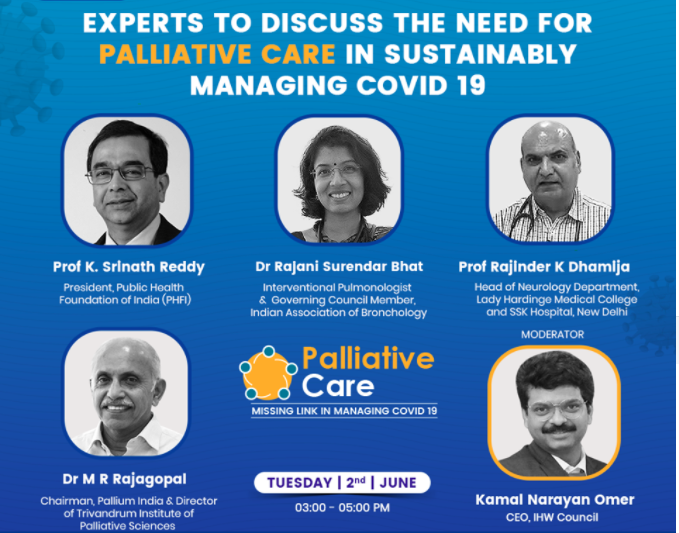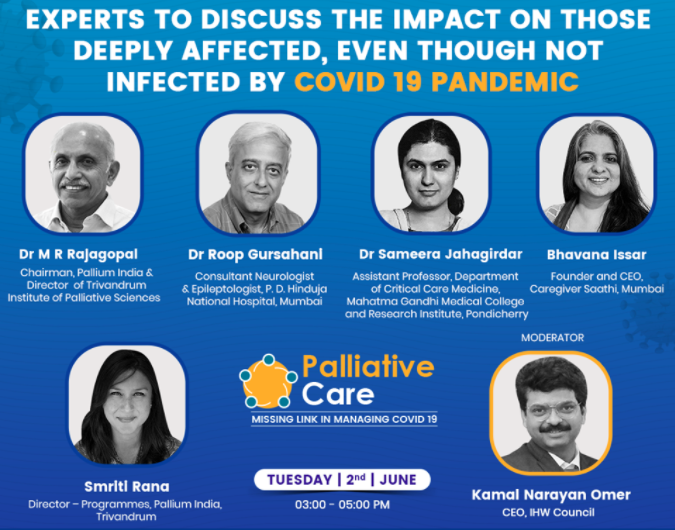Pallium India participates in IHW web series
On June 2, 2020, Pallium India in collaboration with IHW Council, organized an online webinar on the topic “Key role of Palliative Care in COVID19 Era and Beyond”. Hosted by Kamal Narayan Omer – CEO, IHW Council, the webinar was conducted in two sessions addressing the two important aspects of the role of palliative care in COVID19.
The webinar saw the participation of healthcare experts such as Dr M R Rajagopal – Chairman, Pallium India & Director of Trivandrum Institute of Palliative Sciences, Prof K. Srinath Reddy – President of Public Health Foundation of India (PHFI), Dr Roop Gursahani – Consultant Neurologist and Epileptologist at the Hinduja Hospital, Prof Rajinder K Dhamija – MBBS, MD, DNB(Neuro) FRACP, FRCP HOD Neurology Lady Hardinge Medical College New Delhi, Bhavna Issar – Founder & CEO, Caregiver Sathi, Dr Sameera Jahagirdhar – Assistant professor, critical care medicine, Mahatma Gandhi Medical College and research institute, Dr Rajani Surendar Bhat – Interventional Pulmonologist and governing council member, Indian Association of Bronchology, Smriti Rana – Director of Programmes, Pallium India Trivandrum.
Session 1: The Need for Palliative Care in sustainably managing those infected by COVID-19.
During the session, the speakers discussed the importance of responding to the pain of a patient, apart from just curing it. The first three letters of Palliative Care are “PAL”, which is a friend. A doctor and a nurse should be like a friend for showing their empathy, even if they are wearing PPE. Everyone should understand that Palliative Care is not only for end of life there is a need to start talking about Palliative Care for anybody undergoing health-related suffering.
Session Highlights:
During the session, Prof Reddy mentioned that as a part of Palliative care, healthcare providers should allow family members of the affected to communicate with them through recorded or live telephonic messages. This can provide huge emotional support to the patient.
Dr Rajani Bhat said that there is a slow shift in the entire healthcare environment in India towards “humane, ethical healthcare”. The patient knows what their rights are, and their pain needs to be addressed in totality.
Dr Rajagopal stressed upon the importance of addressing the safety of healthcare workers who are currently managing COVID-19. There should be support systems for them to protect them from the social stigma that they are facing now.
Prof Dhamija mentioned that there has to be an element of trust-building on a virtual platform like telemedicine. COVID suspected patients can be easily monitored through telemedicine instead of admitting them in the hospital. This will further help to prevent stigmatization.
Session 2: The impact on those deeply affected, even though not infected by COVID19
In this session, the panel members addressed the sense of foreboding, anxiety, uncertainty among people who were not yet infected by COVID-19, and the stress brought about by the lockdown on them. There is a collective sense of grief and trauma in society right now, and no other discipline is as intimately acquainted with these as palliative cares. The primary duty of the healthcare providers is to mitigate the suffering, and the integration of palliative care into healthcare will help achieve that.
Here’s what our speakers had to say:
Addressing the collective sense of grief, fear, and trauma society is experiencing, Smriti Rana said that trauma is not only a response to an acute event but is the prolonged exposure to a non-normative experience. Palliative care is a tool kit that can customize itself to alleviate the patient’s suffering.
Bhawana Issar pointed out that one of the key tenets of palliative care is that it goes beyond the disease. It looks for that aspect of pain or suffering which is not evident, but should be heard and addressed, and also calls for compassion for both the patient and the affected – their family, friends and caretakers.
Dr Roop Gursahani highlighted that the concept of death should be normalized. An insight that comes from palliative care is that for most people a good death has a huge emotional component that presents itself like a “review”, settling emotional “accounts” and allowing people to pass on comfortably.
Dr Sameera Jahagirdar brought focus on the transphobia that exists in regard to LGBTQIA community, which leads to stigma and discrimination. Addressing various aspects of palliative care, she highlighted that it is extremely difficult for a trans person to avail medical as well as emotional support, leading to degrading mental as well as physical health, social isolation, grief and suffering.
Dr Rajagopal mentioned that there is a need for adoption of policies by the healthcare system that makes it mandatory for every health care delivery institution to provide equitable care for all vulnerable populations
Dr Rajani Bhat addressed the concept of burnout among healthcare workers that is not spoken about in India, especially regarding the pandemic. She says that doctors are unable to address their own sufferings and the impact it has on their mental health. This has become a “moral injury during COVID”.
Prof Dhamija highlighted two different aspects of the pandemic: one, the stigma associated with healthcare workers of being infected; two, the social isolation in marginalized communities. Currently, the healthcare system has a long way to go in terms of helping them out.








